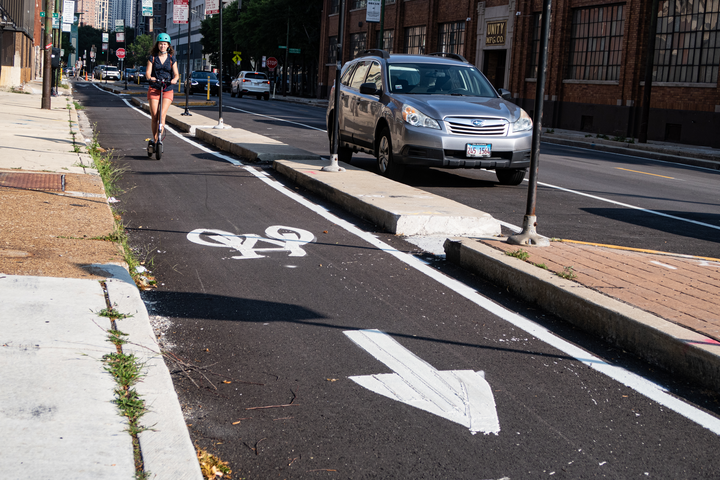Mayor Lightfoot announced Chicago’s first multi-year electric scooter sharing program will launch in early May, introducing 4,000 new micromobility vehicles to city streets and bike lanes.
The new program adds to the urgency for city officials to plan and build a citywide network of protected bike lanes so people on bikes and scooters have safe places to ride.
With gas prices surging, shared bikes and scooters could provide needed alternatives to driving — but only if people feel safe and comfortable riding them.
SCOOTERS TO BE ROLLED OUT CITYWIDE
After two geographically limited pilot programs over the past few years, the new two-year program will bring shared scooters to all Chicago neighborhoods.
The city announced permits for companies Lime, Bird, and SuperPedestrian to operate 1,000 scooters each. These scooters will be available citywide, but the companies are required to deploy at least 50 percent of their fleets daily in Equity Priority Areas on the South and West Sides. All scooters will be equipped with cable locks and are required to be locked to racks or posts.
Scooters cannot be ridden on sidewalks and are not allowed on the Lakefront Trail, the 606, Riverwalk, or Navy Pier.
This program structure reflects many of the priorities Active Trans and our community partners have been pushing for since scooters were first piloted in Chicago in 2019.
The lock-to requirement is critical to limiting clutter and keeping sidewalks safe spaces for people walking, especially older adults and people with disabilities. The equity zone requirement is just as important to make sure scooters are a transportation option for neighborhoods that need them the most.
Active Trans has also long advocated for keeping scooters off the city’s major trails to ensure that these spaces give priority to people walking and biking, which remain the healthiest and most sustainable ways to get around.
NEW DIVVY SCOOTERS AND PRICING
Chicago announced that Lyft, which operates the city’s publicly-owned Divvy bikeshare system, will launch a first-in-the-nation docked electric scooter-sharing program focused on the downtown area. Riders will be incentivized to dock the Divvy scooters in stations as they do with Divvy bikes.
Divvy members will now be able to choose whether to ride a bike or scooter when planning a trip, strengthening the two-wheeled public transit system’s value as a transportation option.
Active Trans has previously advocated for keeping scooters outside of downtown due to concerns about safety issues on crowded sidewalks and particularly the potential problems they pose for people with disabilities and older adults. We are eager to see if the docks help address this serious concern, even with sidewalk traffic down during the pandemic.
Divvy is rolling out a new pricing structure for its scooters, e-bikes, and traditional pedal bikes. We are waiting for more details, but here are some of the new approaches to pricing:
- Divvy members will continue to receive unlimited free unlocks, free rides up to 45 minutes on classic blue bikes, and significantly discounted per minute and out-of-station parking fees for e-bikes and scooters through their existing memberships.
- Lyft is eliminating the equity zone pricing that previously applied to e-bikes, which made e-bikes more affordable for people riding in lower income neighborhoods on the South and West Sides.
- Lyft is eliminating the one-year limit on $5 Divvy for Everyone memberships for qualifying residents and, for the next 12 months, adding a monthly $10 credit (200 e-bike minutes) to their accounts.
Active Trans plans to collect feedback from our community partners on how the new pricing structure affects residents.
TIME FOR A SAFE BIKE/SCOOTER NETWORK
To make scooters a realistic transportation option for the average person, Chicago desperately needs a community-informed plan to build a citywide network of concrete protected bike lanes on major streets. Study after study shows that people will bike and ride scooters for transportation more regularly if we make our infrastructure safer and more seamlessly connected.
For too long, Chicago has taken a patchwork approach to building bike lanes, using paint or plastic to temporarily mark lanes before weather or car and truck traffic limits their usefulness. Chicago’s overall bikeway mileage may be growing but the quality of most lanes is poor.
Chicago must move the needle on getting people from driving for short-distance trips to using micromobility options like bikes and scooters. A network of protected bike lanes would help encourage more people to make this shift.
Chicago officials must seize the moment and use available federal, state, and local funds to finally build out a safe and connected network.

